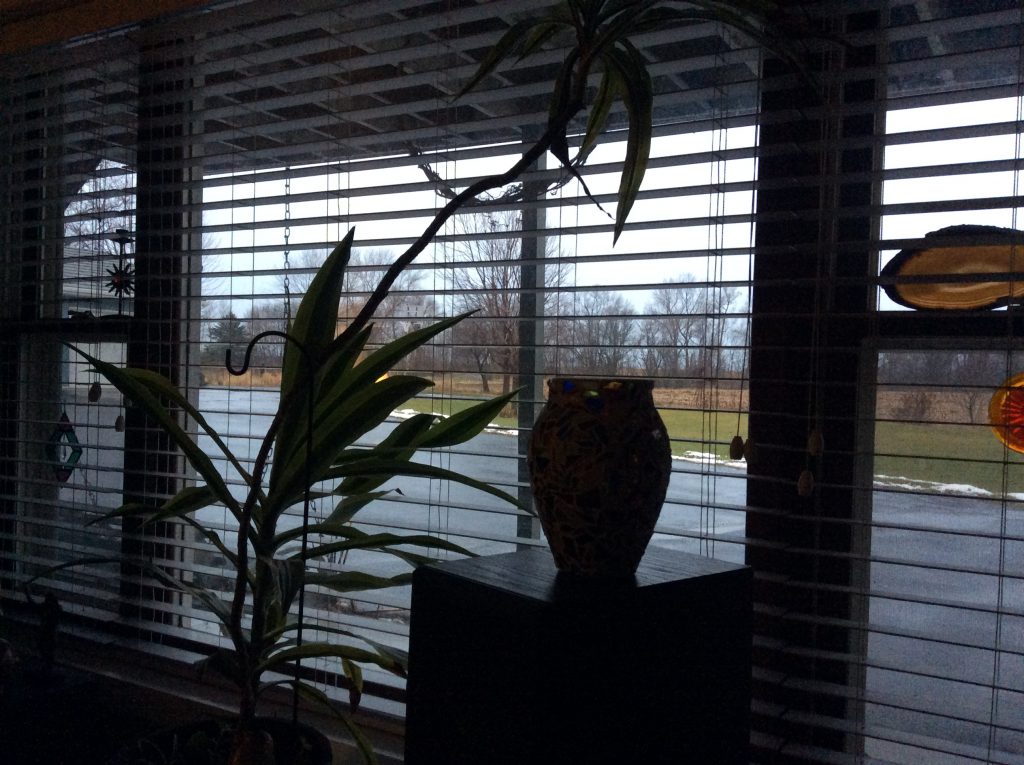Originally posted on Facebook HERE
It’s cold and wet out there today. Nice and warm in the house, though. I love this time of the day. Coffee, books, day off… love it. I’ve been thinking a lot about happiness again lately. Like, am I happy? Could I be happier? What could I do that would bring more joy to my life, and the life of those around me? I think it has to do with making sure that we set ourselves up to love every moment, as much as humanely possible. It’s hard to be happy if you hate your job, for example. That anger will spill over into everything you do. I also think it’s important to help other people whenever you’re in a position to do so. I’m really grateful that my entire working life has been involved in doing things that in some way involved bringing joy to the lives of others, and/or helping them through tough situations. It’s a great feeling when you’ve done something that affects the life of another person in a positive way. I think it’s natural to think about other people, lending a helping hand, and giving during the holiday season. Why do we need holidays to make it a focus, though? And wouldn’t we be happier as a society if we could spend our days doing work that made a difference, and were also involved in activities outside our work that also helped others in some way? Maybe this is where the whole idea of “tithing” comes into play. Giving 10% of everything you make away – for many people, this money goes to their church. Nothing wrong with that. I heard about the concept, and liked it for years before we actually started doing it. How does the idea sit with you right now? Maybe you’re already doing it. And, maybe – if you’re where I was when I first started thinking about it – you’re barely making ends meet now much less trying to live on 10% less. If that’s the case, then giving can come with some strange emotional side effects, like – if I give $20 to this charity, can I pay my electric bill? Seriously, that’s how tight I was when I started giving tithing a consideration. Does that create happiness in your life? In that case, giving can create more anxiety. This is not the emotion you want to tithe with. But, I really felt like the idea of “tithing” was important. So, here’s what I did – I figured out an amount I felt I could afford. Let’s say $5/month. This is really tough for me to write right now, but – I think it was that much, maybe even less that I started with. It has to be an amount you can set aside without being scared it’ll adversely affect paying your bills. For me, it was nowhere near 10% at first. Set it aside, and when you see a situation you’d like to help with, look in that account or that envelope (at first I think I used actual cash in an envelope, eventually I started using a separate savings account), and give what you can. Once money goes into that account, do not use it for yourself, ever. It’s to be given away, in a method that makes you feel good, whether that means the church, a charity, a friend in need – your money, you decide. It takes the anxiety out of giving when things are tight. Because you’re putting aside only what you can afford to give, and that money will always be given away, when you give it, you’re heart will be in the right place. No anxiety. Only love. And the realization that what you have, no matter how dire shape you’re in, is more than enough. Over time, put more away as you can. $10/mo… $15… start using a percentage of your net pay – 1%… 2%… 5%… 10%… There’s a reason almost every great financial book talks about 10%, though. As scary as the thought might be, and it was super scary for us when we made the change, once you get there, it seems like everything just opens up and becomes easier. The “giving” account will become your favorite account. I believe that several people who will read today’s post will have been direct recipients of funds from our account. We’ve been able to help so many people, so many causes we believe in, and it brings us great joy to be in that position. Because my wife Laurie and I both know what it was like when even giving $20 was a scary thought. It’s all about love, you know. Loving every moment. Being happy with what you have. Doing work you love. And giving back. Because, if you’re reading this, you have more than enough. Tithing is a great way to start believing it, no matter what your situation.








2 Comments
Tithing doesn’t have to be just about money. How about giving of your valuable time, which is a great way to give when money is at a premium – a little volunteering for a cause that is dear to your heart costs nothing in money but gains everything in satisfaction.
The concept of “tithing”, particularly as it relates to money and church, is more prevalent in the Southern states than it is up here. I kind of frown on the idea that everyone should just give X percent to their church and call it good, and therefore think that they’re good people.
Organized religion has been the source of most wars in history, as well as most mass genocides, torture and other heinous acts. The hoarding of money was frowned upon by Jesus himself, so I don’t see how giving an organized religious body money so that they can build a mega-church or become the next Jim Bakker is going to improve one’s standing with the Lord. The practice seems to me to stem more from the church accountant than it does from the word of God.
Be a good person. Help those in need. Lend a hand when a hand needs lending. Treat others well…ALL others, not just those who you view as peers or those who you strive to be like. That ‘filthy beggar’ is a person too, and God and Jesus both love him/her. So many of us are a paycheck away from joining them. Like football, life is a game of inches. One turn here or there, and we fortunate could be very unfortunate.
Money can help in many of these cases, but it has to get to the ‘right’ places. Be sure to donate as close to the ‘source’ as you can. Many so-called ‘charities’ can regularly skim 90% off the top of donations just to fund their own existence, which prompts one to ask who is the real beneficiary here? My way of doing this is to keep things local. The more bureaucracy involved, the less goes to those in need. And pitch in…your time is as valuable — perhaps more valuable — than your money.